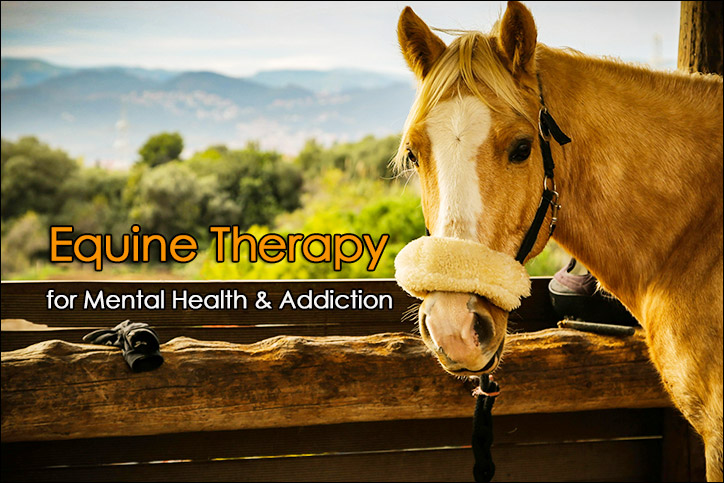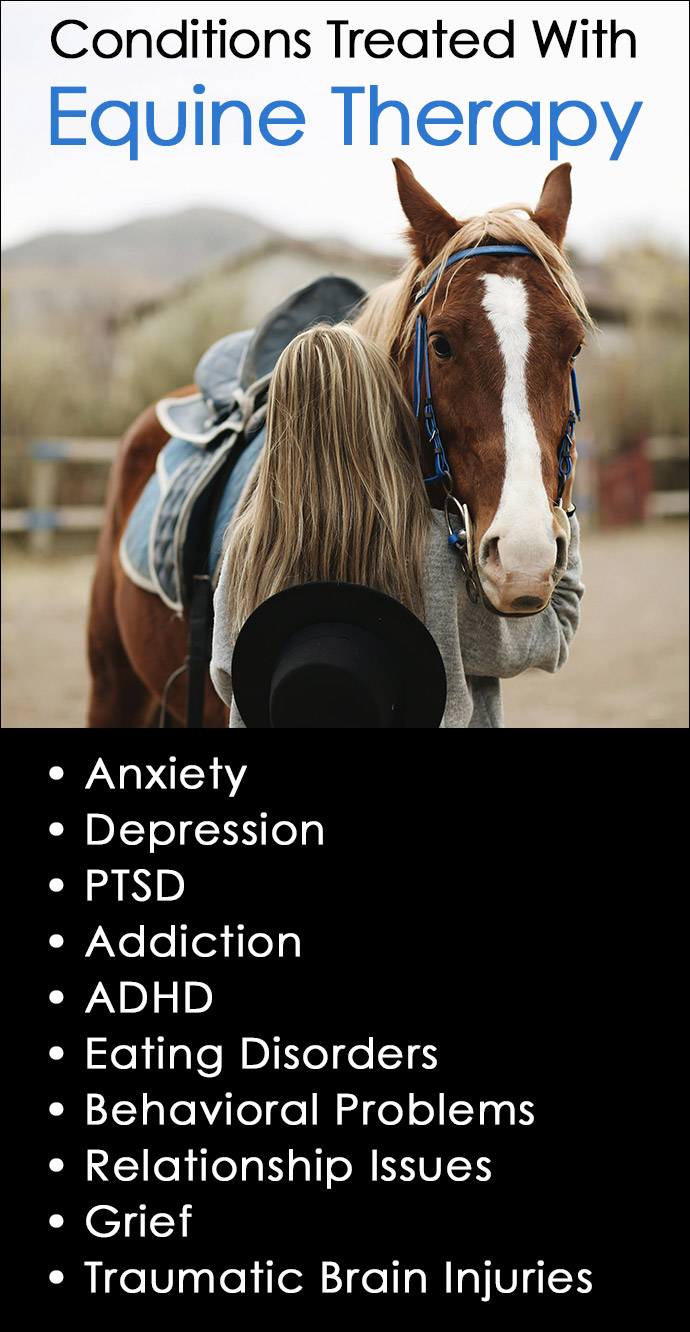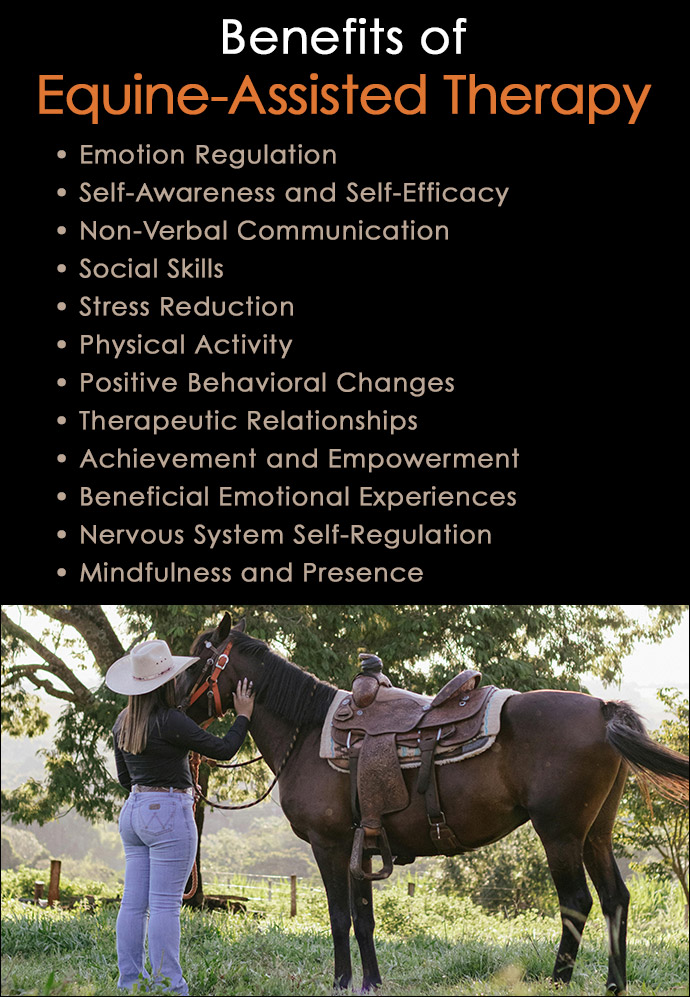Table of Contents
Equine Therapy, sometimes referred to as “horse therapy,” is an effective treatment approach for mental health and addiction recovery.
From its early beginnings to current use, equine therapy has become a valuable resource for treating emotional and psychological conditions.
Its increasing use over the years has shown to be beneficial for healing and recovery for many types of conditions.
What is Equine Therapy?
Equine therapy, also known as equine-assisted therapy, is an experiential treatment modality that nurtures the healing bond between people and horses.
It promotes emotional growth for individuals struggling with a variety of mental health issues.
This type of therapy is often led by a mental health professional who works in tandem with a horse specialist.
It often includes a variety of horse activities that involve feeding, grooming, and sometimes riding, but the focus is mostly on the care, maintenance, and bonding with the horses more than simply riding skills.
History of Equine Therapy
The history of equine therapy dates back to the ancient Greeks, with the first written mention by Hippocrates, often referred to as the father of medicine, around 400 BC.
Hippocrates recognized the therapeutic value of riding horses that laid the groundwork for the future of equine therapy.
In the 17th century, interaction with horses showed physical and psychological benefits for treating certain types of neurological disorders.
The use of horse therapy increased during the 20th century. Liz Hartel of Denmark suffered paralysis from polio, yet she still won a silver medal in dressage at the Helsinki Olympic Games in 1952.
Her achievement highlighted the potential for physical rehabilitation, which led to therapeutic riding programs in Europe and North America in the 1960s.
Horse therapy has become more than just physical therapy today, and now includes treatment for many mental health conditions.
Equine therapy for addiction treatment focuses on the healing bond between humans and horses to address the underlying mental health issues that often lead to addiction.
It offers a non-judgmental environment for building healthy relationships, improving self-awareness, and learning coping skills to prevent relapse.
Types of Horse Therapy
Equine-Assisted Psychotherapy
Equine-Assisted Psychotherapy helps people with mental health issues such as anxiety, depression, mood disorders, and PTSD. It is often led by a mental health professional with training and knowledge of Equine-Assisted Psychotherapy.
Therapeutic Riding
Therapeutic Riding programs are designed to build strength, balance, and spatial awareness for people who require specialized physical or occupational therapy.
Hippotherapy
Hippotherapy is a form of physical or occupational that relies on interactions with horses to improve sensory, motor, and cognitive skills.
Equine-Assisted Learning
Equine-Assisted Learning is an approach for improving personal and professional development skills and goals by working with horses.
Conditions Treated with Equine Therapy
Equine therapy is effective for treating many mental health issues such as:
- Anxiety
- Depression
- PTSD
- Addiction
- ADHD
- Eating disorders
- Behavioral problems
- Relationship issues
- Grief
- Traumatic brain injuries
Benefits of Equine Therapy
Mental Health
Equine therapy improves confidence, empathy, self-esteem and awareness, trust, impulse control, and communication skills. It is also beneficial for reducing anxiety, depression, and feelings of isolation.
Physical Health
Equine-assisted therapy builds strength and endurance, while improving balance, coordination, and motor control.
Emotional and Social Skills
Equine-assisted therapy is an ideal approach for increasing emotional awareness and building interpersonal skills, especially for teens and young adults.
Cognitive Function
Working with horses on a regular basis has shown to improve concentration, short-term memory, and cognitive skills.
How Equine Therapy Works
During equine therapy sessions, individuals engage in care and management activities such as grooming, saddling, and riding to develop a mutual bond with a horse.
The nonjudgmental nature of horses is useful for addressing emotional and mental health issues.
Spending time with horses and developing a bond can reduce stress, anxiety, depression, and improve a person’s mood and mental wellbeing.
Equine-Assisted Therapy for Treating Mental Health Conditions
Equine-assisted therapy is effective for treating mental health conditions for a number of reasons.
Emotion Regulation
Horses are sensitive to human emotions, which helps an individual become aware of their own feelings and how to manage them and better regulate emotions.
Self-Awareness and Self-Efficacy
Interacting with horses enhances self-awareness and self-efficacy, which in turn can have a positive impact on achieving personal goals.
Non-Verbal Communication and Social Skills
Horses communicate primarily through non-verbal cues, which can help clients improve their own non-verbal communication skills and social functioning. This is particularly beneficial for individuals with many types of anxiety disorders.
Stress Reduction
Being around horses has shown to lower blood pressure and stress levels, which is beneficial for individuals with anxiety and depression.
Physical Activity
The physical nature of riding and caring for a horse can improve mental health by reducing the symptoms of depression and anxiety.
Positive Behavioral Changes
Studies have shown that Equine-Assisted Psychotherapy can lead to increased positive behaviors, such as improved adjustment to routines and guidelines, better focus, and reduced stress.
Therapeutic Relationship
The bond that forms between a person and a horse can be therapeutic in itself, providing a sense of unconditional acceptance and companionship that is particularly healing for those feeling isolated or struggling with trust issues.
Achievement and Empowerment
Working with horses and practicing activities such as grooming or leading can provide a sense of empowerment and boost a person’s self-esteem and self-respect.
Beneficial Emotional Experiences
Regularly interacting with horses provides beneficial emotional experiences, which are healing for individuals who have experienced trauma or those dealing with PTSD.
Nervous System Self-Regulation
Working with horses can promote nervous system self-regulation, which is important for individuals with PTSD and other trauma-related disorders.
Mindfulness and Presence
Being present in the here and now and practicing mindfulness while working with horses helps improve these skills, which are beneficial for mental health.
Equine therapy can be highly effective on its own, but it is even more powerful when used in conjunction with other traditional forms of therapy.
What Mental Health Conditions Can Be Treated with Equine-Assisted Therapy?
Equine-Assisted Therapy can be effective for treating a wide range of mental health conditions.
Mental Health Conditions Include:
Anxiety
Equine therapy is ideal for individuals with anxiety by providing a calming environment, teaching impulse control, building confidence and trust, and reducing stress. It offers a unique setting where individuals can learn to cope with their worries in the present moment.
Depression
For those coping with different kinds of depression, equine therapy helps improve mood, overcome depressive symptoms, and build trust and connection. The outdoor environment associated with equine therapy also contributes to improved overall well-being.
Post-Traumatic Stress Disorder (PTSD)
Equine therapy can be particularly beneficial for individuals with many types of PTSD by helping with feelings of vulnerability, processing traumatic experiences, and managing arousal, intrusive memories, and avoidance after a traumatic event.
Attention-Deficit Hyperactivity Disorder (ADHD)
Equine therapy offers an active, fun, and hands-on experience that can appeal to both people with ADHD. It focuses on attention, mindfulness, setting boundaries, social cues, and being present in the moment, which are all beneficial for managing ADHD symptoms.
Addiction
For addiction treatment, equine-assisted therapy offers a safe and calm environment for individuals to gain personal insights and build skills that are useful for recovery.
Trauma
Equine therapy helps individuals who have experienced trauma by promoting emotional processing and healing.
Equine therapy complements other mental health treatment approaches by providing a unique therapeutic bond between humans and horses and is most effective when used in conjunction with other forms of therapy.
Equine Therapy for Addiction Treatment
Equine therapy is effective for addiction treatment because it involves a combination of physical activity, emotional bonding, and the development of practical skills that are essential for recovery.
It provides a therapeutic environment unlike traditional settings that can be particularly appealing and beneficial for those seeking alternative or complementary forms of treatment.
Ways it is Effective for Addiction Recovery
Builds Self-Esteem and Boundaries
Working with horses helps individuals in addiction recovery learn about personal boundaries, build self-esteem, and improve interpersonal communication skills. These are vital for long-term sobriety and developing healthier relationships.
Develops Trust
For those who have experienced trauma or abuse that led to addiction as a coping mechanism, forming a bond with a horse helps rebuild trust. The non-judgmental nature and bond with horses allows individuals to improve trust issues in a safe environment.
Enhances Social Skills
Individuals who build a relationship with horses often notice an improvement in social skills. Grooming and caring for a horse requires attending to the needs of another living being, which can lead to better relationships and enhanced communication skills with others.
Teaches Coping Skills
Horse therapy helps individuals develop coping skills for dealing with stress and addiction triggers that could lead to relapse. Therapy sessions require patience and focus that are beneficial for learning impulse control.
Provides Real-Life Experiences
This form of experiential therapy allows individuals to address their issues in a safe and non-threatening environment and to practice behavioral skills in a real-world setting. This is important for those in early recovery who may be at a higher risk of relapse.
Promotes Physical Activity
Riding and caring for horses is not only therapeutic, but it also provides exercise to build strength and endurance. Physical activity, especially outdoors, helps to increase dopamine and improve mental health and well-being that is beneficial for those in recovery.
Offers a Non-Verbal Connection
Horses are naturally aware of human emotions and provide valuable feedback. This type of non-verbal communication is therapeutic for people who struggle with traditional talk therapy and allows them to connect with another living being in a unique way.
Improves Mood and Reduces Stress
Caring for animals has shown to boost mood and reduce stress. People who interact with pets tend to experience lower blood pressure, heart rate, and are better at dealing with stress, anxiety, and depression.
Instills a Sense of Purpose
Taking care of a horse builds trust and instills a sense of purpose. This sense of purpose and responsibility can be a powerful motivator in the recovery process.
Addresses Psychological Challenges
Equine therapy helps individuals work through many types of emotional and psychological challenges. Horses can sense human emotions and feelings and offer direct feedback and insights into a person’s behavior.
Equine therapy provides a unique and therapeutic approach to mental health and addiction treatment to promote recovery, personal growth, and long-term healing.
Learn more about treating mental health and addiction with Equine Therapy in Malibu, California.





